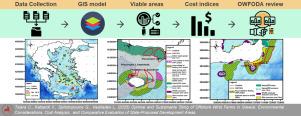Optimal and sustainable siting of offshore wind farms in Greece: Environmental considerations, cost analysis, and comparative evaluation of state-proposed development areas
IF 7
2区 工程技术
Q1 ENERGY & FUELS
Sustainable Energy Technologies and Assessments
Pub Date : 2025-10-09
DOI:10.1016/j.seta.2025.104586
引用次数: 0
Abstract
This study addresses the critical need for sustainable offshore wind farm (OWF) siting in Greece by developing a comprehensive GIS-based methodology that balances environmental considerations with economic viability. The study identifies optimal OWF locations by applying exclusion criteria (e.g., NATURA2000 Network) and evaluating dynamic, site-specific parameters. A subsequent cost analysis of eligible sites was conducted calculating Life-cycle Cost () and Levelized Cost of Energy () indices tailored for floating wind turbines; verified as the most suitable technology for Greece’s deep waters. Three scenarios with varying turbine nominal power (42 × 5 MW, 21 × 10 MW, 14 × 15 MW) and fixed total 210 MW capacity were analyzed. Key findings indicate that the Aegean Sea can achieve highly competitive values as low as €60/MWh. The use of larger turbines reduced the by approximately 41%. A critical comparative review of the state-proposed development areas revealed significant alignment in 14 out of the 25 plots; however, serious concerns were identified for the others due to conflicts with environmental and socio-cultural criteria. This work provides a novel framework for OWF strategic planning and a critical evaluation of Greece’s national plan, offering policymakers a vital tool to balance energy goals with environmental imperatives and advance the blue economy sustainably.

希腊海上风电场的最佳和可持续选址:环境考虑、成本分析和国家提议的开发区域的比较评估
本研究通过开发一种综合的基于gis的方法来平衡环境考虑和经济可行性,解决了希腊可持续海上风电场(OWF)选址的关键需求。该研究通过应用排除标准(例如,NATURA2000网络)和评估动态的、特定地点的参数来确定OWF的最佳位置。随后对符合条件的站点进行成本分析,计算为浮动式风力涡轮机量身定制的生命周期成本(LCS)和平准化能源成本(LCOE)指数;被证明是最适合希腊深水的技术。分析了汽轮机标称功率(42 × 5 MW、21 × 10 MW、14 × 15 MW)和固定总容量为210 MW的3种工况。主要研究结果表明,爱琴海可以实现低至60欧元/兆瓦时的极具竞争力的LCOE值。大型涡轮机的使用使LCOE降低了大约41%。对国家提议的开发区进行的一项重要的比较审查显示,在25个地块中,有14个地块具有显著的一致性;然而,由于与环境和社会文化标准相冲突,对其他国家表示严重关切。这项工作为OWF战略规划提供了一个新的框架,并对希腊的国家计划进行了批判性评估,为政策制定者提供了平衡能源目标与环境要求并可持续推进蓝色经济的重要工具。
本文章由计算机程序翻译,如有差异,请以英文原文为准。
求助全文
约1分钟内获得全文
求助全文
来源期刊

Sustainable Energy Technologies and Assessments
Energy-Renewable Energy, Sustainability and the Environment
CiteScore
12.70
自引率
12.50%
发文量
1091
期刊介绍:
Encouraging a transition to a sustainable energy future is imperative for our world. Technologies that enable this shift in various sectors like transportation, heating, and power systems are of utmost importance. Sustainable Energy Technologies and Assessments welcomes papers focusing on a range of aspects and levels of technological advancements in energy generation and utilization. The aim is to reduce the negative environmental impact associated with energy production and consumption, spanning from laboratory experiments to real-world applications in the commercial sector.
 求助内容:
求助内容: 应助结果提醒方式:
应助结果提醒方式:


